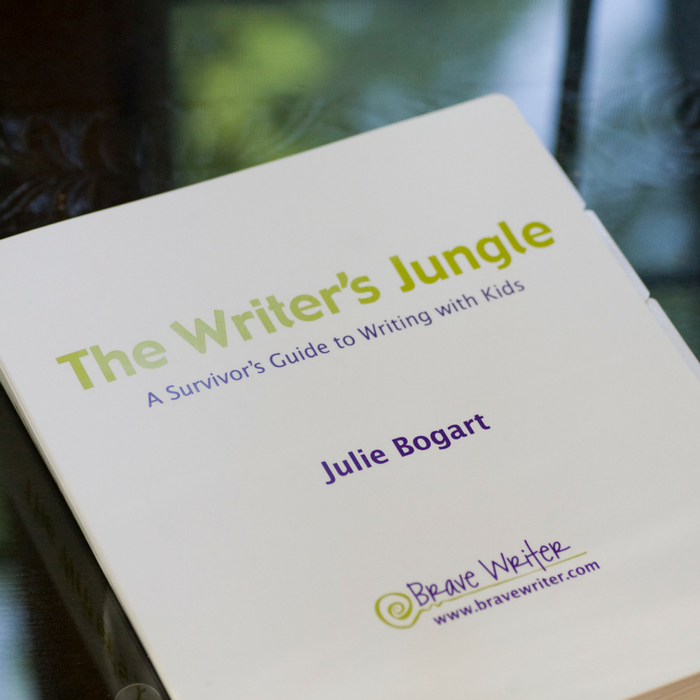A Little Love for the Old Battle Axe
When I began Brave Writer (Jan 2000), I had one goal—help parents help their kids to write without fear. My initial scribbled outlines of possible directions for The Writer’s Jungle had notes about paragraphing, descriptive writing, narrative versus expository writing, and more.
One morning, I got up to read my notes and wilted. I knew that wasn’t what was needed and I certainly didn’t want to write it. Kids weren’t struggling with writing because parents had yet to read the definitive explanation of what constitutes a paragraph.
Parents weren’t frustrated by their children’s childish errors in spelling, punctuation, handwriting, and grammar because they didn’t know how to correct the mistakes.
Rather, parents were frustrated because all those explanations in the programs they already owned weren’t resulting in lively, enthusiastic writing from their kids, with visibly improving mechanics. Tears, anger, boredom—a lack of confidence about what the results meant (were their kids writing well enough?).
Meanwhile all the books I read about writing for my adult writing life had helped me become a much better writing coach to my own children.
I realized: The murky process of generating writing had not yet been adequately addressed for parents at home working with their own children.
The manuals I read showed “sample paragraphs” that weren’t even well written (organized, yes; but dull, lifeless). They taught methods like: “Here’s a sentence in three words. Now add an adjective to make it longer.” Some of them gave such a long script of instructions, any chance for the child’s natural voice to show in the writing was gone before the pen hit the page.
As I wrote more and more about writing and parenting, it struck me that this new writing resource ought to enhance the empathetic connection between parent and child (creating emotional safety for writing risks) while giving the parent-child team tools to help them excavate the inner life of the child and get that to paper.
The Writer’s Jungle is my earliest attempt to express all that information—those goals. I wrote it in my late 30s at a point in my writing career where I was working with non-writers every day—growing and expanding their writing for publication. I spent a lot of energy helping adults find their writing voices. I never once explained what constitutes a paragraph to them.
I didn’t envision The Writer’s Jungle being a “curriculum” in the traditional sense. I assumed parents had scads of writing prompts in their various homeschool curricula for English and history, or school assignments they needed to supervise and support at home.
These parents needed a set of tools (like a corkscrew or can opener) to access the language living inside their kids, without prompting tears, resistance, and pain. I imagined a parent reading The Writer’s Jungle a chapter at a time, even moving around it like a reference book, if they wanted to, using it to help them help their kids write their assignments!
- This piece needs revision; I’ll flip open the chapter on revision and work through the suggestions with Charley.
- Mary’s vocabulary seems to be evaporating when she goes to writing. Maybe the chapter on word games will help us free some words for writing.
- I know the revolutionary war period is too big for writing. We can use the Topic Funnel to scale it down.
It never occurred to me that anyone would find it a challenge to use The Writer’s Jungle!
It was designed so simply!
- Read, do; read, do.
- No required time frame.
- No expected pace.
- Processes to be used again and again, morphing and changing to support any kind of writing you might explore with your kids, or that might be assigned to them!
- Chapters that could be used in a variety of sequences.
- Injunctions to grow as a homeschooling parent by reading for pleasure, too, so that everyone in the family became more and more aware of quality prose and language use.
- A detailed guide to the developmental stages of growth in writing instead of scope and sequence.
- Sample schedules of writing projects for 10 months a year, all ages and stages.
When anyone suggests that the “program” is not “organized,” it startles me a bit.
Teaching writing is not a program.
It doesn’t follow a specific set of steps. Programmatic writing instruction is the reason so many kids don’t like writing, and so many adults still lack confidence as writers!
Imagine teaching kids to speak via “program” or “schedule.” Imagine helping a child learn to walk with a curriculum, or learn to sew by tackling a pattern and working through each skill without having ever used a sewing machine!
Writing grows organically first, as would-be writers are introduced to processes that help them learn to express themselves.
Play with the processes; grow as a writer.
Once a writer is freely self-expressing, applying those skills to writing projects is as natural as giving an oral report once a child is a fluent speaker.
It’s been 20 years since I wrote the first draft of The Writer’s Jungle. It deserves a revision (fingers crossed: within the next couple of years) if only to add all the amazing writing and experiences our families have shared with us!
Ultimately Brave Writer has widened and deepened over the years—our offerings are vast and there is so much good free information on the website and blog (check the sidebar!), you can get really far with us without spending a penny!
I felt a need to write a little apologetic for our old battle axe: The Writer’s Jungle. Even though there are passages in it that I’d rewrite in a hot minute (clunkers and overstatements, humor that was funnier in 2000 than now), my message hasn’t changed.
Writing is not a linear process of step-by-step instructions.
Writing is first and foremost an interior look—pairing language with thought. Writing is about becoming able and facile in this process—with greater and greater linguistic dexterity. It’s exploring the murky, non-linear process of committing ideas to language and language to paper.
Writing benefits from partnerships—with parents or teachers or friends or editors who give content-centered feedback with the heart and goal of enhancing, enriching, and expanding what is there.
There are pain-free processes that support that partnership. These are in The Writer’s Jungle, all of our products and classes, and 100 other writing books written by other writers, not specifically written for homeschoolers.
It’s my hope that you will spend your money and time wisely—taking advantage of all we offer through Brave Writer for free—purchasing what helps you feel brave and competent to facilitate this non-linear process with your kids.
I still love the heart, message, and methods of The Writer’s Jungle. I stand by them.
To all of you who advocate for Brave Writer out there in homeschool discussion board land, thanks for helping to get the real message out. You humble me and move me with your stories.
To sum up—The Writer’s Jungle is a compendium of processes and wisdom to help parents partner with kids and to help kids find their writing voices. That’s it!
I appreciate you. Happy planning! Happy writing!




















